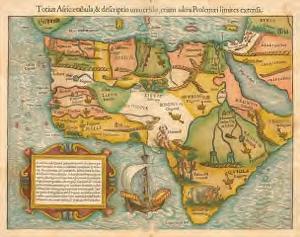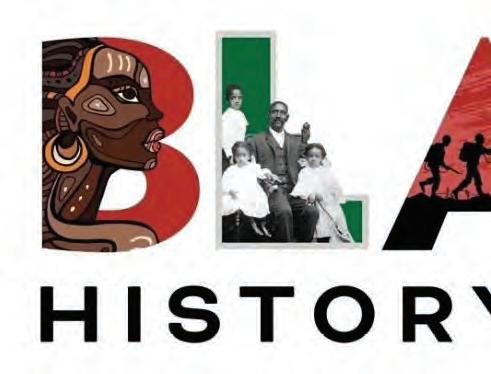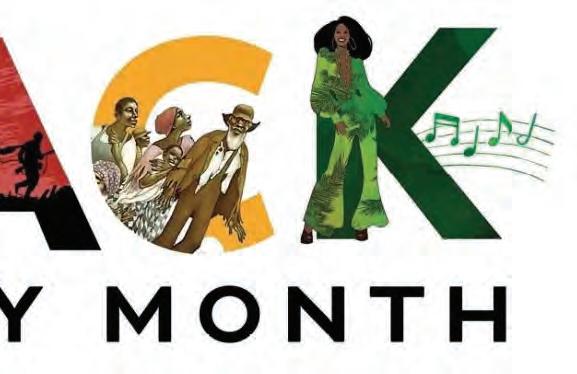
7 minute read
How Did We Come by the Name ‘Africa’? – Is it a Foreign Import?
By NII NTREH | Associate Editor
themselves do not beg the curiosity of most, even the avowed well-wishers of said places. Perhaps, it is very human to not have to wonder about the meaning of a place-name. We tend to fi nd meaning and our connection to these places after we are thrust into that space by fate. This may well be a forgivable existential defi ciency but in a related discourse, the etymology and etiology of continents such as Europe and America are not as discreet and controversial as Africa’s. Africa is spelled as such or with a ‘k’ instead of a ‘c’. This even reveals a disparity in how the continent is appreciated. Those who cling to the ‘k’, often Rastafarians and others of extremely Afrocentric persuasion Sebastian Münster’s map of Africa in 1554. Photo Credit: (sometimes called hoteps), claim that Princeton University Library Afrika was the spelling endorsed by the continent’s natives prior to colonization by
Africa‘s primordial role in the inception and the Europeans. The globally-acclaimed Africa is sophistication of the human race has been superbly therefore usurpation. But this claim is problematic documented for so many decades; sometimes out for two reasons. of genuine anthropological and biological curiosity First, spoken language, which precedes writing, and other times, because of racism. is phonetic and not alphabetic. Writing is an attempt
We have been told that the fi rst ancestors of to formally render sound discernible in other the human race were formed on the continent. ways other than through the ears. Alphabets are So were the earliest attempts at human self- characters written to capture the qualities of speech preservation and community made in the east and sounds. To that eff ect, spelling the continent’s south of the continent more than one million years name with ‘c’ or ‘k’ can honorably be dismissed as a ago. The cradle of human civilization as it is called, matter of style Africa’s meaning to the general human story is not and not in debate, largely. substance.
On the other hand, however, what the name of Substantially, the continent means and how we came to call it the way in ‘Africa’ are two of the least-raised and answered which the questions about the mother continent. Frankly, name is toponomastics, the research into the meaning of mentioned place-names, is not the most popular branch of can be seen the historical sciences except when a place-name as more is so out of the common that it begs our curiosity. important.
The names of countries and continents Second, if

we are to believe that Afrika is how the continent was spelled before 15th-century Europeans invaded and changed it, we would be making a claim that is anachronistic as it is embarrassing. It is embarrassing simply because we would imply by such belief, to not know much about the history of the internationalization of the phonetic alphabet. It would be anachronistic because the international phonetic alphabets are not based on African history and culture. They are based in Latin. Neither ‘k’ nor ‘c’ was originally African until Europeans started verbalizing African languages for their own benefi t as well as for the sake of standardization.
Unless of course we would like to claim the Latin alphabets were borne out of the Egyptian hieroglyphics. Technically, that is true since the very ancient Mediterranean civilizations learned from one another, as humans usually do, and the Egyptians preceded the Romans. But between ancient Egypt and the Romans were tens of thousands of years, so much so that the fi nal form of the Latin alphabets looks nothing like the pictorial Egyptian hieroglyphics.
Arguing that the ‘k’ spelling is a moral rebellion against Eurocentrism leaves so much to be desired if we aim to be intellectually honest. Then again, that is not the most critical problem. How did we come by the name of the continent? Theories abound in this regard.
According to the fi rst-century common era Jewish historian Flavius Josephus, Africa is named for Epher, that biblical grandson of Abraham mentioned in Genesis 25:4. The medieval Iberian author Isidore of Seville claimed Africa comes from the Latin aprica, or ‘sunny’.

Out of the culture of the Dogon o f West Africa, there comes a theory Sebastian Münster’s map of Africa in 1554. Photo Credit: Princeton University Library

that Africa is the corruption of Afraka which means ‘soul of the fi rst-sun’.
The Afrocentric author Ivan Van Sertima took after the English poet and Egyptologist Gerald Massey who alleged that Africa comes from afru-ika, which meant ‘toward the opening of Ka (the eternal universal energy in ancient Egyptian culture)’. Massey, and thus Sertima, conclude that this translation means the phrase was used to denote the continent that is thought to have given life to all – the birthplace or motherland.
The diffi culty with informing ourselves on this topic is that it is deeply polarizing as Africa exists in unavoidable tension with Europe, the place from which Africa’s plunderers came. As Frantz Fanon would have it, African or Black from Africa is defi ned in opposition to whiteness from Europe that has for centuries destroyed the former. But the tension is not entirely between Africa and Europe but also among Africans and Africans in the diaspora.
The Hegelian task of self-determination for those who have been suppressed and enslaved has historically motivated factionalism. Two hundred or
History from page 85
so years ago in the New World, we learned of the tension between the house negro and fi eld negro. These days, we learn of the tension between those who are passionately Afrocentric and those who are accused of not being enough.
The seemingly simple problem of charting the historical path of the etymology of Africa suff ers from the ginormous political problem of Afrocentrism and how much of it is permissible. While the likes of Sertima are accused of motivated reasoning, those who are on the other side of the debate are accused of having been brainwashed by westerners.
The most-embraced theory of Africa’s etymology is actually a mixture of inland and outland infl uences. The 19th-century German philologist Karl Ernst Georges, as well as an American lexicographer of the same century, Charlton Thomas Lewis, agree that the name of the continent was taken from afri, adjective after, the name used by Latin speakers to describe the north coast of the continent after the Third Punic War in the second century before the common era. What the name originally goes to refer to is, however, a modern problem.
In 1981, Michel Desfayes, a French philologist, theorized that the root word of afri was the Berber speech denotation (word) for ‘cave’ – ifri, mentioned ‘i-fri’. Desfayes further argued that name ifri is demonstrative of the cave-dwelling social existence of the ancients. But before Desfayes theory, it was thought the Latin name came from the Phoenician afar, which meant ‘dust’.
Many contemporary philologists agree that the Latin afri was not of Roman creation in the way that ‘Berber’ is linguistically Greek and later Roman. Afri was informed by a phenomenon alien to the Romans. That phenomenon could very well be found on the African continent.
What is of complete Roman ingenuity is the addition of the suffi x ica. The ancient Romans added ica to nouns to adjectivize lands and people. The suffi x was the plural of icus. The Celtae owned Celtica; Britannica is of Britannia; Germanica is of Germania. And Africa is of the Afri.
Even still, after the Third Punic War gave the Romans a foothold in the north coast of Africa, the term ‘Africa’ was not used in reference to the entire continent of darker-skinned people or even in reference to the entirety of the whole north of the continent. It would take centuries before ‘Africa’ referred to the whole continent immediately south of Europe. Where the forebears of the Europeans called Africa or Proconsularis Africa, is today’s Tunisia and parts of Libya and Algeria. On this matter, one can refer to cartographers from the distant past.
The German professor, Sebastian Münster and his map of 1554 show what would be unfamiliar to us in the present day. Münster clearly indicated in his map of the “Extended Descriptive Map of the Whole of Africa” that ‘Africa’ was on the north coast of the continent. Egypt and Ethiopia, two ancient kingdoms, were not seen as ‘African’ in the 15th century.
In fact, before the Romans would rise as the power in the northern hemisphere, it was the Greek term ‘Libya’ that popularly described all the lands west of the Nile and Egypt. Where the Greeks and Romans called Libya, the Arabs called Ifriqiya or El-Maghrib el-Adna during the MiddlesAges.
Those who were to the south of the Egyptians were the people of the land of Aethiopia, also a Greek invention.
But by the middle of the 16th century, Africa as the name of the whole landmass now called home by Africans, was in vogue. Intriguingly, the continent called Africa has been known as such for not more than 500 years. https://face2faceafrica.com/article/how-did-wecome-by-the-name-africa-is-it-a-foreign-import?mc_ cid=1fc23b563b&mc_eid=d15554bd65 Image credit: www.ebay.com, www. positivepromotions.com/Black_History/Month_ Products










